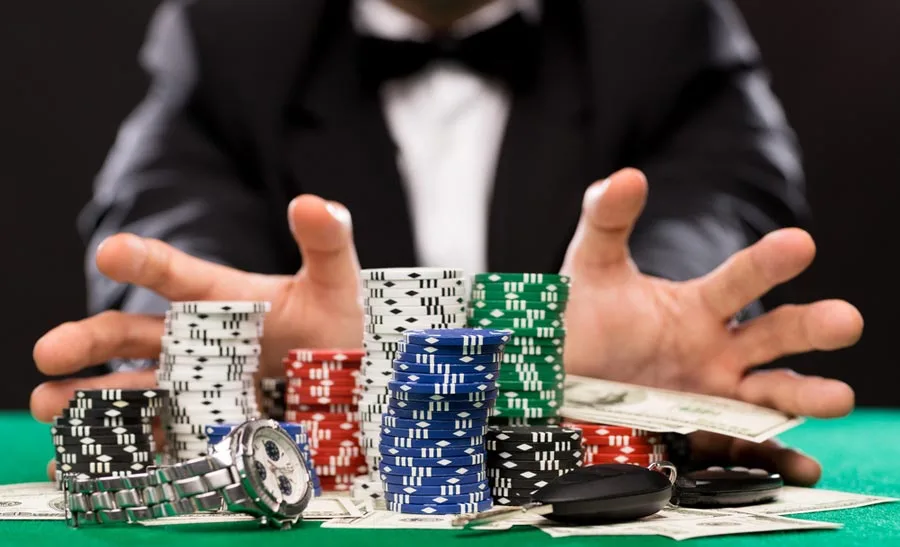Effective Methods for Overcoming Process Addiction
For those who suffer from addiction to a substance – any substance at all – heroin, cocaine, alcohol, wine, liquor – endure what’s commonly known as substance addiction or suffer from substance abuse disorder. Process addiction treatment is a bit different, as it addresses problematic and compulsive behaviors such as shopping and gambling to excess.
Though different from chemical addiction, these process addictions still come with marked negative consequences and are chronic and even potentially fatal if not combated with the proper avenues of treatment.
Keep reading to find out more about process addiction treatment and how the Exclusive Hawaii Rehab offers outstanding programs of treatment to help overcome these crippling conditions!
Experience True Healing
Our deeply-caring staff and the surrounding natural beauty offer an unparalleled healing experience.
The Other Side of Addictive Behavior: Process Addiction
On the other end of the addictive behavior spectrum, opposite drug addiction exists process addiction – also known as a behavioral addiction. Strangely, despite the fact that both of these are considered mental disorders and are technically classified as diseases, it’s difficult for a person with process addiction to empathize with a person with substance addiction, and vice versa.
Even though many of the thought patterns, chemical releases, triggers, and emotional dynamics are similar, it’s not uncommon to hear someone with a substance abuse disorder echo the sentiment, “I don’t understand gambling addiction or video game addiction.”
If you or someone you love is experiencing complications associated with process addictions, and you’re curious about process addiction treatment, Exclusive Hawaii Rehab maintains a drug and alcohol treatment center that also focuses on people struggling with certain behavior issues who require a personalized treatment plan to address underlying causes of things like problem gambling, shopping addiction, food addiction, internet addiction, and other types of common process addictions.
In the meantime, the following article provides the information you should be aware of before you seek treatment regarding the negative consequences of process addiction and other serious behavioral health conditions.
Defining Behavioral Addiction as a Mental Health Disorder


As counterintuitive as it may sound, some behaviors can be just as addictive as drugs. The mental health issues referred to as “process addictions” are extremely harmful.
An intense desire to engage in a certain behavior characterizes those who suffer from a process addiction, also known as a behavioral addiction. A person with a process addiction continues to engage in the behavior despite its negative effects on their mental, social, or physical health.
Substances like alcohol and narcotics are not involved in process addictions. Instead, the actions themselves serve as a reward and cause a surge of positive emotions. All aspects of a person’s life suffer as a result of the compulsive actions that feed behavioral addictions.
Those with process addiction, like those with any other addiction, are powerless to quit engaging in the behavior on their own and require process addiction treatment to break the revolving door of things like gambling addiction and food addiction.
The Presence of Addiction Disorder and the Absence of Chemical Substances
Even though substance abuse is usually what comes to mind when people think of addiction, it is possible for addiction to exist in the absence of substances. Those who suffer from drug addiction or behavioral addictions that consistently give them a pleasurable experience are more likely to continue doing so.
Those who suffer from process addictions engage in harmful, compulsive behaviors on a regular basis. A person may experience regret and humiliation after engaging in the conduct, but this is not enough to stop them from exiting the cycle and refraining from behavioral patterns.
Behavioral Addiction and Drug Abuse: So Close, Yet So Far
Though they differ in that they don’t include substances, process addictions are very much like substance abuse. Like those who suffer from drug and alcohol abuse, those with process addictions have no choice but to repeatedly engage in the addictive behavior.
Like drug addictions, those with process addictions become preoccupied with the action itself and will make considerable efforts to avoid the unpleasant feelings that would occur from discontinuing it. Behavior continuation in the face of known negative consequences is characteristic of both substance and process addictions – one of the major ties that bind these two seemingly distant compulsive behaviors.
Varying Types of Behavioral Addictions


The following are examples of addictive processes:
- Gambling Addiction
- Sex Addiction
- Internet Addiction
- Food Addiction
- Social Media Addiction
- Shopping Addiction
- Work Addiction
- Video Game Addiction
l(DSM) exclusively referred to “substance-related disorders,” but the fifth edition (DSM-5) expanded this to include process addictions. Despite the category’s presence, the DSM-5 only presently recognizes gambling illness as a behavioral addiction.
Gambling disorder’s inclusion in the DSM-5 seems to be a step toward acknowledging process addictions as significant behavioral health illnesses, even though many of these addictions have yet to be formally defined as mental health disorders.
Quick Facts Regarding Process Addictions
Evidence from studies of addictive behaviors shows that process addictions are more frequent than most people realize:
- Over 10% of the United States population fit the criteria for a gambling disorder diagnosis
- 6% of Americans suffer from retail addiction
- Work addiction plagues 5-10% of Americans
- 68 million search queries per day – or over 25% of all searches on any given day in the United States are related to pornographic or sexually explicit material. 35% of all downloads are of the pornographic variety.
Experience True Healing
Our deeply-caring staff and the surrounding natural beauty offer an unparalleled healing experience.
Indicators of the Presence of Process Addictions
There are indicators that can help you recognize when a friend or loved one is struggling with a process addiction. Common signs of process addiction include:
- Investing an inordinate amount of time in either the thought of or the action
- Decreased capacity to regulate behavior
- Persisting in a course of action despite knowing it would lead to distress
- Problems with self-control, including repeated failures to alter a problematic behavior
- Putting off or avoiding one’s work, school, or family obligations in favor of this behavior
- Employing the practice as a means of handling stressful sensations and emotions
- Downplaying the seriousness of the issue
- Increasing the frequency or intensity of the behavior in order to maintain the same level of pleasure and fulfillment from it when tolerance develops.
- Having feelings of withdrawal when the behavior is avoided or suppressed
- The emergence of post-behavioral mental health problems like anxiety, irritability, depression, or substance dependence
A More In-Depth Look at Varying Types of Process Addictions
Several widespread patterns of addictive behavior are recognized. These process addictions can have far-reaching negative effects on a person’s mental and physical health.
The following are examples of some of the most widespread forms of process addiction:
Gambling Addiction


The inability to refrain from gambling despite adverse monetary, emotional, or social repercussions characterizes compulsive gambling. Various games at casinos, such as slot machines and card tables, as well as the lottery, betting on horses, and raffles, all fall under the general category of gambling. Nowadays, you may find a variety of gambling games on the web.
Addiction to gambling manifests itself in several ways, the most obvious of which include preoccupation with the activity, financial difficulties or even bankruptcy as a direct result of gaming, and changes in living arrangements to accommodate the habit. When someone starts gambling regularly because they think they can rapidly fix their money difficulties by betting a small amount and winning a huge sum, they may develop a gambling addiction. The cycle begins when someone loses money and then feels compelled to win back their initial investment.
Porn Addiction
Another form of obsessive behavior, porn addiction, is spending excessive amounts of time absorbed in pornographic media to the exclusion of all else. However, despite the detrimental effects it has on their lives, people with a porn addiction still seek out pornographic material.
Sex Addiction
Intimacy illnesses include sex addiction and love addiction. A sexual addiction is defined by an obsessive need for sexual gratification, whether to relieve stress or improve one’s mood. A person with sex addiction is unable to control their sexual urges,m and as a result, may engage in risky sexual behavior and have obsessive thoughts about their sexual partners and sexual encounters.
Love Addiction
An unhealthy obsession with finding love and feeling loved is known as a “love addiction.” A person with a love addiction has a firm conviction that finding true love will resolve all of their problems and actively seeks out romantic relationships as a means of improving their sense of value and safety. As a result, many individuals engage in destructive patterns of interaction with others.
Video Game Addiction
Addiction to video games is characterized by a reluctance to stop playing despite negative effects on one’s psychological, physiological, or social well-being. Thus, obsessive gaming behavior characterizes those who suffer from this form of addiction to video games.
Eating Addiction
Addiction to eating is both a mental illness and a process addiction. Addiction to food arises when a person continues to consume despite negative consequences, such as weight gain or other health issues. Withdrawal, tolerance, and cravings are all possible outcomes of an eating disorder. Addicts to eating may comfort themselves with food in times of distress.
Internet Addiction
Addiction to the internet is defined as excessive internet use that interferes with daily life. Addiction to the internet interferes with good time management and can have negative effects on physical and mental health, such as an increased risk of obesity, insomnia, depression, and a decline in social skills. According to the DSM-5, further study is required before internet addiction may be recognized as a diagnosable mental disease.
Retail/Shopping Addiction


When it comes to spending money, obsessive shoppers are characterized by irrational behavior that spirals out of control. Addiction to shopping can have devastating effects on a person’s personal and professional life. Those who suffer from shopping addiction report feeling ecstatic pleasure while shopping, which reinforces and encourages the habit.
People who suffer from shopping addiction often keep their buying habits a secret because they feel so guilty and ashamed after a shopping binge. Shopaholics may use shopping as a form of therapy for low self-esteem or as an antidote for mood disorders including anxiety and despair.
Exercise/Gym Addiction
Addiction to exercise is a potentially dangerous preoccupation with physical activity. Eating disorders and negative body image can lead to an addiction to exercise. People may become addicted to exercising because they become dependent on the high they get from the flood of feel-good endorphins their bodies produce as a result of physical activity. Addiction to exercise can lead to negative physical and mental health effects, including extreme weight loss.
What Causes Process Addictions?
Process addiction can be caused by a combination of biological, social, and environmental variables. People with process addictions are more likely to participate in these behaviors because they lead to a pleasurable state triggered by the activation of the brain’s reward circuits.
Addiction can also be the result of other factors, such as stress, bad relationships at home, or a history of abuse or neglect. It can be a coping mechanism for dealing with emotional distress and stress; hence environmental factors are also relevant. Addiction is already a complicated and difficult process, and co-occurring mental health issues can cause obsessive behaviors.
Predisposed Factors for Process Addictions
Individuals with a family history of addiction are at a greater risk for developing their own addiction themselves, demonstrating the powerful role that genetics plays as a risk factor for compulsive behaviors. Neglect, abuse, abandonment as an adolescent, a lack of parental guidance, or a chaotic household. are other risk factors.
Addictive Behaviors and Substance Misuse as Co-Occurring Disorders
Process addiction and drug misuse usually occur together and are often triggered by the same emotions and desires. Some forms of process addiction, such as those involving sex, porn, or gambling, have been shown to have a strong correlation with substance misuse. Substance use disorder and process addiction are separate but similarly ineffective coping mechanisms. Process addiction and drug abuse often coexist and mutually reinforce one another in people who cycle between the two.
Process Addiction Therapy


Since many people with process addictions can’t just “choose themselves” to stop, treatment typically needs outside help from experts. If not addressed, process addictions can have far-reaching consequences in a person’s home, school, workplace, finances, and social life.
Psychotherapy that incorporates behavioral changes is commonly used in the treatment of process addiction. Treatment also includes methods like cognitive behavioral therapy, which aim to help clients learn to control negative beliefs and replace them with healthy ones. People in therapy learn to recognize and avoid relapse triggers, explore the origins and consequences of their addiction, and develop constructive strategies for dealing with cravings and urges.
When another issue, such as substance abuse or mental illness, occurs with process addiction, treatment for both illnesses is required. The treatment plan must take into account the interplay between each disorder.
Experience True Healing
Our deeply-caring staff and the surrounding natural beauty offer an unparalleled healing experience.
Break the Cycles of Suffering with Process Addiction Treatment
At Exclusive Hawaii. Rehab, we specialize in multiple forms of behavioral addictions in addition to drug addiction. A mental health disorder is a serious issue, and one for which only the most experienced professionals should be trusted.
If you or someone you love is suffering from sex addiction – or any other form of behavioral addiction, we can help. Our behavioral addiction specialists are standing by to help you break the cycle of these crippling habits, allowing you to live a satisfying, fulfilling life without fear of embarrassment or shame. In cases of co-occurring disorders, our behavioral addiction specialists are also prepared to treat clients with dual diagnosis treatment to attack the root of the issues.
For more information on how we can help you with our process addiction treatment plan, contact a member of our Intake Coordination team today for a confidential consultation!